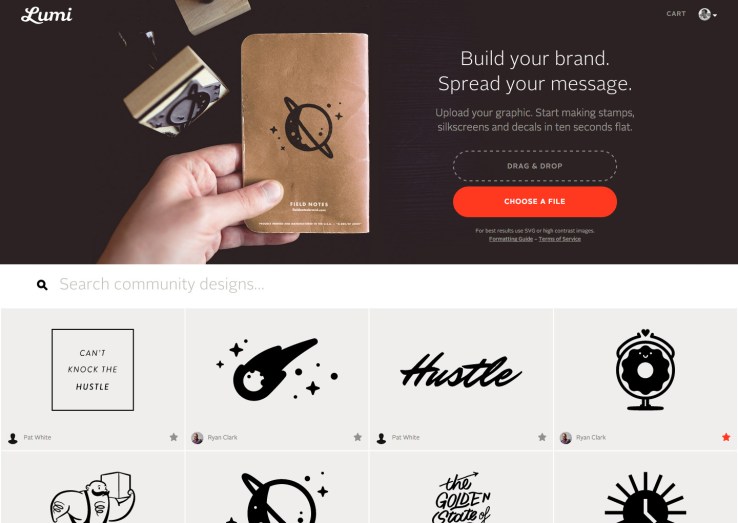
Customization pretty much comes standard in today’s online world. but when it comes to offline goods, we are still limited in many ways by the designs chosen by manufacturers. 3D printing has done its part in changing that, but a new YC-backed company, Lumi, is looking to offer a different set of customization tools.
Lumi turns any graphic into a rubber stamp or silk screen, which sold as a part of a tool kit that includes ink and everything else you need to customize any surface.
The idea started back in 2012 when the Lumi founders, Jesse Genet and Stephan Angoulvant, launched a Kickstarter campaign for a special Lumi printing process. The process included the use of Inkodye (special water-based dye that develops color in sunlight), which can bind to any vegetal or animal fiber, like cotton, linen, wool, silk, suede and wood.
The Inkodye Kickstarter blew past its $50k goal, reaching beyond the $250k mark, and went on to be sold online and in retail stores.
“What we were really doing that time, as we saw the retailers and the customers and the way that they were using it, was learning how people gravitate to this sort of creative product,” said Genet.
With the new Lumi, not only is the company providing the physical invention of these dyes that can be used to permanently customize any surface, but they are working on giving their users all the tools necessary to complete that customization project.
The team has spent the past few years iterating on their original app to let users upload graphics (logos, text, etc.) that can be turned into silk screens and rubber stamps.
The idea here isn’t to churn out custom t-shirts like a Zazzle, but rather to give artists, fans, and small-to-medium sized businesses the chance to hold the tools themselves. With a Lumi toolkit, users aren’t limited to ball caps and t-shirts because they aren’t limited by the product or surface that they’d like to customize.
So, a shop owner could theoretically buy their own silk screen kit from Lumi to make t-shirts for new retail associates, where they may be high churn. A grassroots band may not want to carry hundreds of shirts with them on the road, but they can bring a kit and print just what they need for certain shows. Or — and this is my favorite example — an artist who sells their own furniture designs on Etsy can put their own stamp on the bottom of any of their pieces, from wood to glass to fabric.
In terms of major competition, there isn’t anyone who does quite what Lumi does for the same price. You could get a much more expensive and complicated system from Michaels or Hobby Lobby, but Lumi handles all of the hardest steps of silkscreening and/or making custom rubber stamps so that the user has control without doing much heavy lifting.
Lumi’s kits start as low as $8 for a small vinyl decal, but don’t stretch beyond the $25 mark. The kits include everything you need to customize, from ink to the actual tools, except the actual item you want to customize. Silk screen kits from Lumi can make up to 100 impressions.
What’s better, each time you complete the Lumi customization process and check out, you can share your design with the Lumi community. In other words, I can upload and buy a silkscreen kit for the TC logo, and other Lumi users will be able to shop for their own TC silk screen or rubber stamp from the design I uploaded.
Lumi is launching out of beta now and is thus far totally bootstrapped, save for the $250k from Kickstarter and seed investment from Y Combinator.
To learn more about Lumi, you can check out the website here.
from TechCrunch http://feedproxy.google.com/~r/Techcrunch/~3/x-7jhzE7BUg/
via IFTTT







0 коммент.:
Отправить комментарий